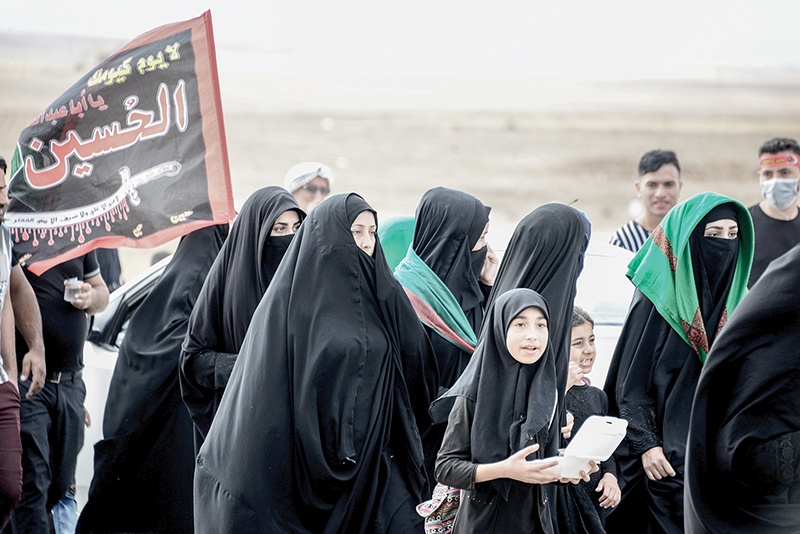

KARBALA:Thousands of Iraqis chanted anti-corruption slogans during the Shiite Arbaeenpilgrimage to the holy city of Karbala yesterday, responding to firebrandcleric Moqtada Al-Sadr's call to keep up anti-government protests. Amid thethrongs of black-clad pilgrims mourning the seventh-century death of ImamHussein, Sadr supporters dressed in white demanded "No, tocorruption!" and "Yes, to reform!".
Waving Iraqiflags, they chanted "Baghdad free, corrupt ones out!" Sadr, whoselist emerged as the largest bloc in parliamentary elections last year, helpedPrime Minister Adel Abdel Mahdi to form his government. But on Tuesday hecalled on Twitter for his supporters to march in shrouds. Iraq -- the second-largestOPEC oil producer -- is "a rich country where the people are poor,"Khedheir Naim told AFP.
The grey-beardedman came from the southern oil city of Basra to join the world's largest Shiitepilgrimage, which culminated yesterday. He denounced corrupt leaders, whoaccording to official figures pocketed 410 billion euros over the past 16years. "Unfortunately, tyrants and criminals live handsomely at theexpense of the people," Naim said. Denouncing corruption has been aprimary theme of the protest movement shaking Iraq, alongside demands for jobsand functional services.
In a single weekof protests at the start of the month, 110 people were killed and 6,000injured, according to official figures. Calls have been made for fresh marcheson October 25, to mark the anniversary of the government that is the focus ofpublic anger. The annual Arbaeen pilgrimage sees millions of worshippers,mostly Iraqis and Iranians, converge by foot on Karbala, 100 kilometers southof Baghdad.
Arbaeen marks theend of the 40-day mourning period for the killing of Imam Hussein, grandson ofthe Prophet Mohammed, by the forces of the caliph Yazid in 680 AD. Placardswith anti-United States and anti-Israel messages are often seen in the crowd,though anti-corruption slogans are rare. Despite warnings from Iranianauthorities for pilgrims to delay travelling, 3.5 million people -- mostlyIranians -- officially entered Iraq by land borders by Friday.
Shiite Muslimsfrom the Gulf also attended, like Saudi Talib Al-Ghadir. "It's necessaryto make the pilgrimage regardless of the situation in the country," hesaid. "We haven't seen anything outof the ordinary, even if people from the Gulf came at the last minute becauseof the protests." Last year, more than 14 million worshippers visited thegold domed mausoleum where Imam Hussein is buried.
Iraqi bloggerreturns
In other news, aprominent Iraqi blogger resurfaced Friday a day after he was seized by maskedgunmen, his father said, as Amnesty International denounced a "climate offear" in the country after protests and deadly violence. ShujaaAl-Khafaji's family said armed men had snatched him from his home on Thursdaywithout identifying themselves or showing an arrest warrant.
Khafaji'sFacebook page, Al-Khowa Al-Nadifa (Arabic for "Those Who Have CleanHands"), carries posts on political and social issues and has some 2.5million followers. "Around 15 men wearing masks and black uniforms"took Khafaji from his home, the blogger's father, Fares al-Khafaji said. Hesaid they seized his son's phones and computers, but were not violent.Twenty-four hours later, Khafaji was "abandoned in a street with $20 topay for a taxi home", his father added.
The report ofKhafaji's seizure sparked an outcry from activists and influential politicalleaders. Rights watchdog Amnesty International denounced a "relentlesscampaign of intimidation and assault against activists in Iraq" byauthorities. "The Iraqi authorities must immediately rein in the securityforces and dismantle the climate of fear they have deliberately created to stopIraqis from peacefully exercising their rights to freedoms of expression andassembly," said Lynn Maalouf, the group's Middle East research director.
The group saidother activists, including a doctor and a lawyer, were "forciblydisappeared more than 10 days ago", and called on Iraqi authorities toreveal their whereabouts. Firebrand Shiite cleric Moqtada Sadr wrote on Twitterthat "any act of aggression (against journalists or activists)... by thestate constitutes an attack on freedom of speech". Former Prime MinisterHaider Al-Abadi's parliamentary bloc called on the government "to stopabuses of free media". Iraq was gripped by anti-government protestsbetween October 1 and 6, during which 110 people, mainly demonstrators, werekilled in clashes with security forces. - AFP

